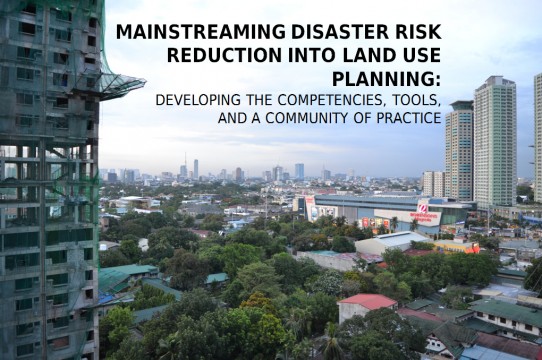Mainstreaming DRR into Land Use Planning for a Climate-Resilient Quezon City

OML Center Scientific Director and staff visited IRRI
December 11, 2016
Mangrove restoration study co-authored by OML Center Research Fellow, Dr. Juanico, now available online
December 11, 2016By: Kurt Gabriel Ducusin
Manila, Philippines – Residents, government offices, businesses, and investors in Quezon City (QC) should worry less about losing theirs assets in times of disasters as the Earthquake and Megacities Initiative Inc (EMI), in partnership with the Oscar M. Lopez Center for Climate Change Adaptation and Disaster Risk Management Foundation Inc. (OML Center), enhances the competency of QC’s Technical Working Group (TWG) through the Mainstreaming Disaster Risk Reduction into Land Use Planning: Developing the Competencies, Tools, and a Community of Practice Project.
This project aims to enhance the competencies of the QC TWG in Risk Sensitive Land Use Planning (RSLUP) through problem-solving mentoring sessions that will promote and sustain knowledge sharing and transfer. In this project, hands-on sessions will be conducted covering the following topics:
- Visualizing Hazards, Vulnerability and Risks, using GIS as a tool;
- Identifying City Risk Hotspots and their Implications to land use management, particularly Zoning;
- Integrating Risk Hotspots into Hazard Overlay Zoning and its provisions to development regulations; and
- Communicating RSLUP to planners, engineers, land development owners and other stakeholders.
The project started on February 2015 and is expected to end on January 2016. At the end of the project, a closing forum will be held to provide an opportunity for the QC TWG to share their experiences and for other stakeholders to benefit and learn from them.
“The project is intended for Quezon City with the possibility of scaling up at the national level once the training process has been defined and tools have been developed for other local governments,” explains EMI Senior Scientist Mr. Jerome Zayas.
National government agencies will be engaged through the formation of an Advisory Committee that will provide further inputs to the project, validate assumptions by the QC TWG, and give guidance on national policy and directions. This Committee will be the mechanism for meaningful involvement of key national agencies in the project.
EMI is among the seven (7) recipients of OML Center’s 2014 Research Grants. For more information, please send email to info@omlopezcenter.org.

